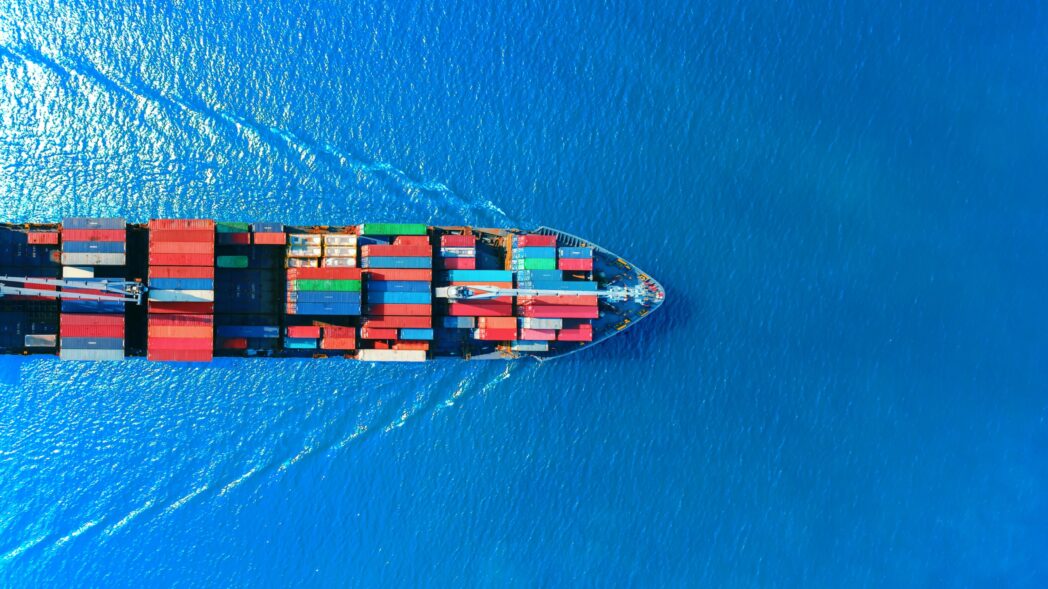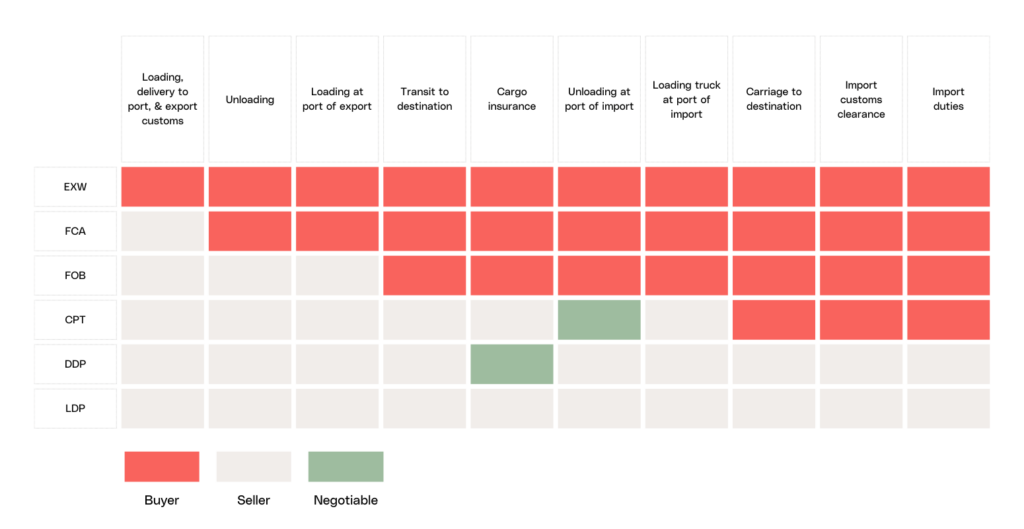Jun 28, 2023
Expansion Tips
5 logistics challenges to overcome when selling internationally
From customs to payments to shipping, let’s take a look at the top logistics challenges for brands selling internationally.
Using correct export terminology is vital to prevent financial loss. Our glossary clarifies Incoterms, aiding smooth transactions and helping your brand go global. Explore key terms now!

If you want your products to reach customers worldwide, you must understand how to trade between countries in today’s world.
But first, you must understand how the international supply chain works for wholesale distribution of products. There are 10 steps to this process. Their names are pretty self-explanatory, but let’s dive into them:
1. Loading, Delivery to Port & Export Customs: preparing the products for shipping and loading onto a truck or train that takes them to the port.
2. Unloading (at the Export Port): the cargo arrives at the port of origin and is unloaded.
3. Loading at Port of Export: The cargo is loaded onto a shipping vessel, such as a container ship, bulk carrier, or other transport vessel.
4. Transit to Destination: the ship transports goods across international waters.
5. Cargo Insurance: insurance covers risks such as loss, damage, or delays during transit.
6. Unloading at the Port of Import: Once the ship reaches its destination country, cargo is unloaded at the import port. Containers are then transferred to storage areas while awaiting customs clearance. Port authorities then check for compliance with import regulations.
7. Loading Truck at Port of Import: The products are loaded onto trucks or trains after customs clearance (if required at this stage).
8. Carriage to Destination: The products are transported to their final destination, the buyer’s location or warehouse.
9. Import Customs Clearance: Customs authorities inspect documents and cargo to ensure compliance. At this stage, import duties and taxes are calculated.
10. Import Duties & Taxes: Before the products can be released, import duties, VAT, and other taxes must be paid.
The International Commercial Terms, a.k.a. Incoterms, are agreed upon between the sellers and buyers and define who will be responsible for each of these 10 steps. They are usually a three-letter abbreviation with exact definitions, and they are the world’s essential terms of trade for the sale of goods.
See below the most commonly used Incoterms in the fashion and beauty industry.
FOB (Free on Board): Widely adopted, FOB requires the seller to deliver the goods to the port of shipment and load them onto the vessel. Once the goods are on board, buyers assume the risks and costs.
EXW (Ex Works): In this arrangement, the seller makes the goods available at their premises, and the buyer assumes all transportation costs and risks from that point onwards. This term is commonly used when buyers have extensive logistics capabilities.
LDP or Landed: Although not an official Incoterm, LPD or “Landed” describes a seller’s responsibility for delivering goods to a specific location or port, including transportation costs, customs duties, and other charges.
DDP (Delivered Duty Paid): The seller is responsible for delivering the goods to the buyer’s designated location in DDP. The seller covers all costs, including transportation, customs duties, and taxes. This provides a comprehensive solution for international buyers, as the seller handles all aspects of delivery.
CPT (Carriage Paid To): CPT requires the seller to deliver the goods to a carrier or named destination. The seller covers transportation costs to the specified destination but assumes no risk after delivery to the carrier.
FCA (Free Carrier): FCA requires the seller to deliver the goods to a carrier or party specified by the buyer at a named place. Once the goods are delivered to the carrier, the risk transfers to the buyer, giving sellers flexibility in choosing the place of delivery.
Incoterms differ in the point of delivery, risks, and costs assigned to each party.
– FOB and EXW place more responsibility on the buyer for transportation and associated costs.
– DDP and LDP involve the seller handling all aspects of transportation and associated costs.
– CPT and FCA find a balance between seller and buyer responsibilities, with the risk transferring at different stages.
The chart below illustrates in an easy-to-understand way some Incoterms and whether the buyer or seller is responsible for each of the steps we mentioned before:

We’ve all agreed that choosing the right Incoterm is crucial for successful export sales. Incoterms help both parties understand their responsibilities. When in doubt, always consult with experts or legal professionals.
Incoterms are international commercial terms that define the responsibilities of sellers and buyers in global trade. They clarify who is accountable for shipping, insurance, and tariffs while transporting goods.
Understanding Incoterms is crucial for sellers to avoid financial loss and transaction misunderstandings. They help delineate responsibilities, reducing disputes over shipping costs and risks.
Selecting the right Incoterm depends on your shipping capabilities and the level of responsibility you wish to assume. For tailored advice, consider consulting logistics experts or legal professionals.